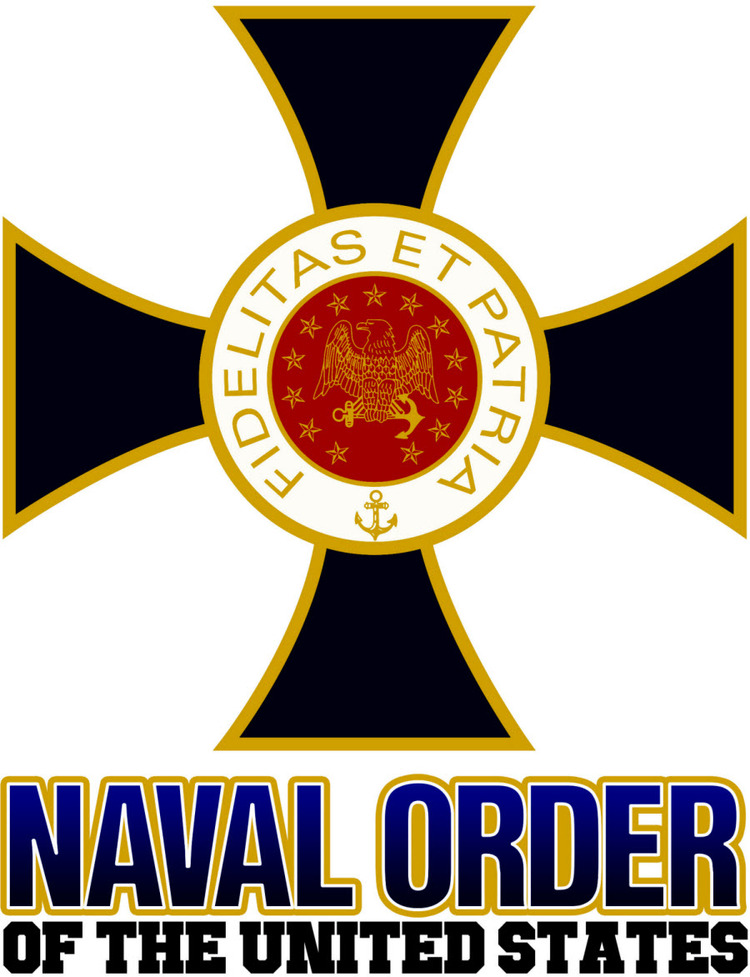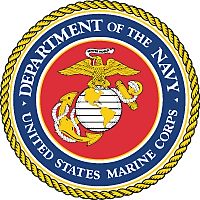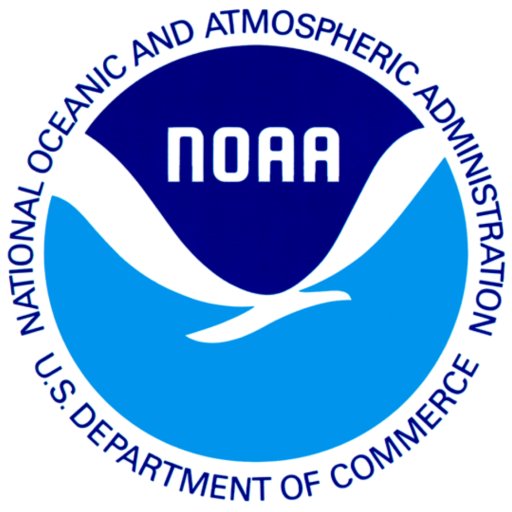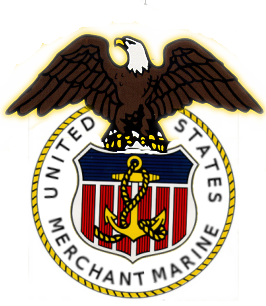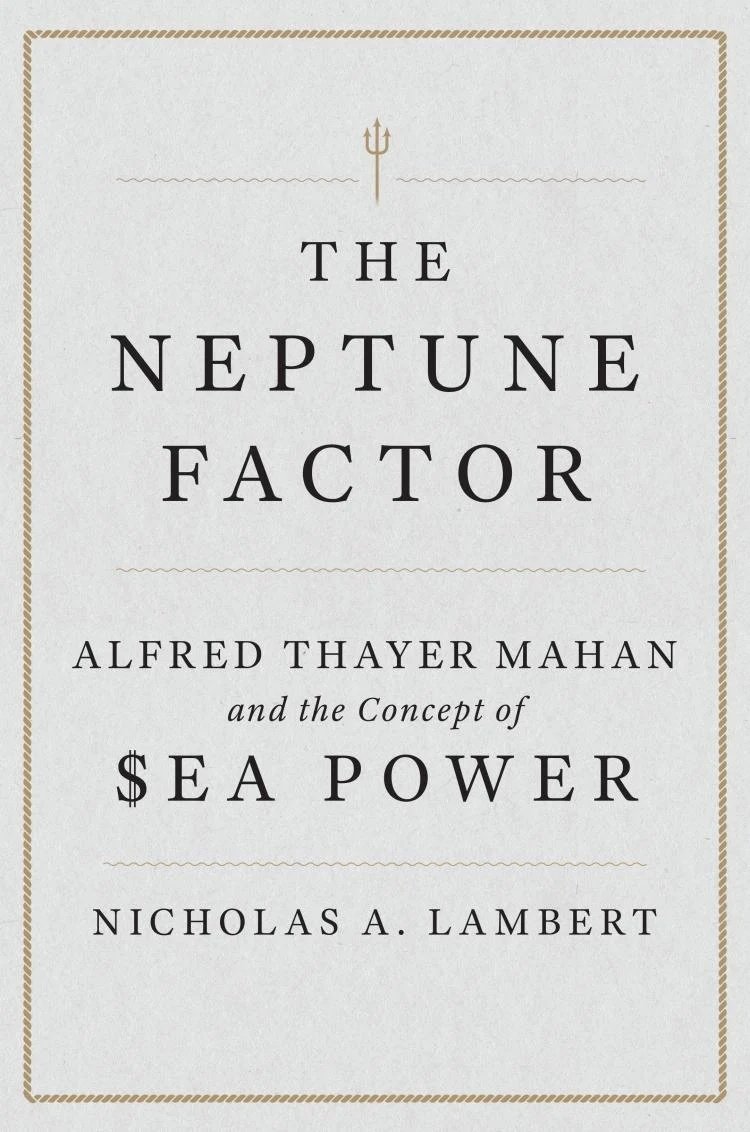
by Nicholas A. Lambert
Winner of NOUS' 2024 Samuel Eliot Morison Award for Naval Literature
Capt. A.T. Mahan's central argument was that the outcome of rivalries on the seas have decisively shaped the course of modern history. Although Mahan's scholarship has long been seen as foundational to all systematic study of naval power, Neptune Factor is the first attempt to explain how Mahan's definition of sea power shifted over time.
Ordering Info: Naval Institute Press
Publisher: Naval Institute Press, 2024

by Eric Jay Dolin
Winner of NOUS' 2023 Samuel Eliot Morison Award for Naval Literature
The best-selling author of Black Flags, Blue Waters reclaims the daring freelance sailors who proved essential to the winning of the Revolutionary War. The heroic story of the founding of the U.S. Navy during the Revolution has been told before, yet missing from most maritime histories of America’s first war is the ragtag fleet of private vessels, from 20-foot whaleboats to 40-cannon men-of-war, that truly revealed the new nation’s character―above all, its ambition and entrepreneurial ethos. In Rebels at Sea, Dolin corrects that significant omission, and contends that privateers, though often seen as profiteers at best and pirates at worst, were in fact critical to the Revolution’s outcome. Armed with cannons, swivel guns, muskets, and pikes―as well as government documents granting them the right to seize enemy ships―thousands of privateers tormented the British on the broad Atlantic and in bays and harbors on both sides of the ocean. Abounding with tales of daring maneuvers and deadly encounters, Rebels at Sea presents the American Revolution as we have rarely seen it before.
Ordering Info: Amazon
Publisher: Liveright (imprint of W. W. Norton), 2022

by Paul Stillwell
Winner of NOUS' 2022 Samuel Eliot Morison Award for Naval Literature
The first-ever biography of Vice Admiral Willis A. Lee Jr., who served a key role during World War II in the Pacific. Battleship Commander explores Lee's life from boyhood in Kentucky through his eventual service as commander of the fast battleships from 1942 to 1945. Paul Stillwell draws on more than 150 first-person accounts from those who knew and served with Lee from boyhood until the time of his death.
Ordering Info: Naval Institute Press
Publisher: Naval Institute Press, 2021

by M. Ernest Marshall
Winner of NOUS' 2020 Samuel Eliot Morison Award for Naval Literature
Suspecting a war with Japan somewhere over the horizon, the American Navy needed a means of conducting surveillance of the vast Pacific Ocean to guard against invasion. Surface vessels were too slow, and the Navy had too few of them, and airplanes lacked the range to cover the Pacific Ocean. The Navy turned to airships (dirigibles) as a solution - vehicles that could range for thousands of miles in the air on a single tank of fuel. Rear Admiral Herbert V. Wiley and Vice Admiral Charles E. Rosendahl - close friends - were with the Navy's airship program from beginning to end. After the loss of the Navy's last airship, Rosendahl went on to develop the blimp program that guarded America's entire coastline during WW II.
Ordering Info: Amazon
Publisher: Naval Institute Press, 2019

by Hampton Sides
Winner of NOUS' 2019 Samuel Eliot Morison Award for Naval Literature
On Desperate Sides tells the story of one of the most harrowing clashes in American history, the Battle of Chosin Reservoir, during which Mao’s numerically superior armies surrounded and tried to destroy the First Marine Division in the frozen mountain wilds of North Korea. In this deeply researched work of literary non-fiction, bestselling historian Hampton Sides offers a gripping chronicle of the extraordinary feats of heroism performed by the beleaguered Marines, who were called upon to do the impossible in some of the most unforgiving terrain on earth.
Ordering Info: Amazon
Publisher: Doubleday, 2018

by John Wukovits
Winner of NOUS' 2018 Samuel Eliot Morison Award for Naval Literature
An epic narrative of World War II naval action that brings to life the sailors and exploits of the war's most decorated destroyer squadron. When Admiral William Halsey selected Destroyer Squadron 21 (Desron 21) to lead his victorious ships into Tokyo Bay to accept the Japanese surrender, it was the most battle-hardened US naval squadron of the war. But it was not the squadron of ships that had accumulated such an inspiring resume; it was the people serving aboard them. Sailors, not metallic superstructures and hulls, had won the battles and become the stuff of legend. Men like Commander Donald MacDonald, skipper of the USS O'Bannon, who became the most decorated naval officer of the Pacific war; Lieutenant Hugh Barr Miller, who survived his ship's sinking and waged a one-man battle against the enemy while stranded on a Japanese-occupied island; and Doctor Dow "Doc" Ransom, the beloved physician of the USS La Vallette, who combined a mixture of humor and medical expertise to treat his patients at sea, epitomize the sacrifices made by all the men and women of World War II. Through diaries, personal interviews with survivors, and letters written to and by the crews during the war, preeminent historian of the Pacific theater John Wukovits brings to life the human story of the squadron and its men who bested the Japanese in the Pacific and helped take the war to Tokyo.
Ordering Info: Amazon
Publisher: Da Capo Press, 2017
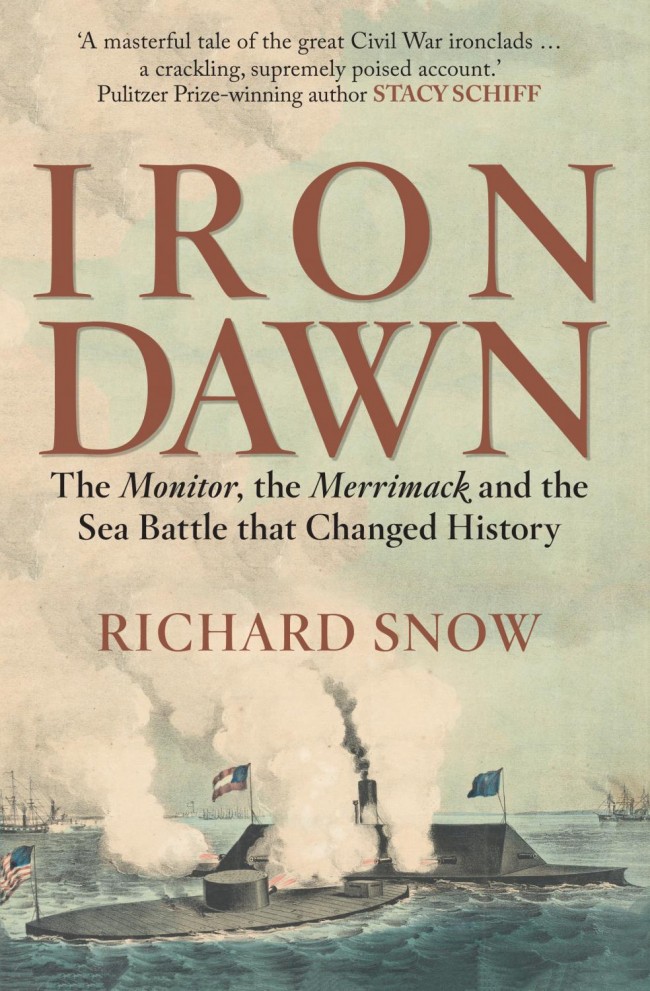
by Richard Snow
Winner of NOUS' 2017 Samuel Eliot Morison Award for Naval Literature
No single sea battle has had more far-reaching consequences than the one fought in Hampton Roads, Virginia, in 1862. The Confederacy, with no fleet of its own, took a radical step to combat the Union blockade, building an iron fort containing ten heavy guns on the hull of a captured Union frigate named the Merrimack. The North got word of the project, and, in panicky desperation, commissioned an eccentric inventor named John Ericsson to build the Monitor, an entirely revolutionary iron warship. Rushed through to completion in just one hundred days, it mounted only two guns, but they were housed in a shot-proof revolving turret. The ship hurried south from Brooklyn, only to arrive to find the Merrimack had already sunk half the Union fleet—and would be back to finish the job. When she returned, the Monitor was there. She fought the Merrimack to a standstill, and, many believe, saved the Union cause. As soon as word of the fight spread, Great Britain—the foremost sea power of the day—ceased work on all wooden ships. A thousand-year-old tradition ended and the naval future opened.
Ordering Info: Amazon
Publisher: Scribner, 2016

by Tim McGrath
Winner of NOUS' 2016 Samuel Eliot Morison Award for Naval Literature
America in 1775 was on the verge of revolution—or, more likely, disastrous defeat. After England’s King George sent hundreds of ships to bottle up American harbors and prey on American shipping, John Adams of Massachusetts proposed a bold solution: The Continental Congress should raise a navy.
“A meticulous, adrenaline-filled account of the earliest days of the Continental Navy.”—New York Times Bestselling Author Laurence Bergreen
Ordering Info: Amazon
Publisher: NAL; Reprint edition 2015

by Craig Symonds
Winner of NOUS' 2015 Samuel Eliot Morison Award for Naval Literature
Craig L. Symonds now offers the complete story of this Olympian effort, involving transports, escorts, gunfire support ships, and landing craft of every possible size and function. The obstacles to success were many. In addition to divergent strategic views and cultural frictions, the Anglo-Americans had to overcome German U-boats, Russian impatience, fierce competition for insufficient shipping, training disasters, and a thousand other impediments, including logistical bottlenecks and disinformation schemes. Symonds includes vivid portraits of the key decision-makers, from Franklin Roosevelt and Churchill, to Marshall, Dwight Eisenhower, and Admiral Sir Bertram Ramsay, who commanded the naval element of the invasion. Indeed, the critical role of the naval forces--British and American, Coast Guard and Navy--is central throughout.
Ordering Info: Amazon
Publisher: Oxford University Press, 2014









by Nicholas A. Lambert
Winner of NOUS' 2024 Samuel Eliot Morison Award for Naval Literature
Capt. A.T. Mahan's central argument was that the outcome of rivalries on the seas have decisively shaped the course of modern history. Although Mahan's scholarship has long been seen as foundational to all systematic study of naval power, Neptune Factor is the first attempt to explain how Mahan's definition of sea power shifted over time.
Ordering Info: Naval Institute Press
Publisher: Naval Institute Press, 2024
by Eric Jay Dolin
Winner of NOUS' 2023 Samuel Eliot Morison Award for Naval Literature
The best-selling author of Black Flags, Blue Waters reclaims the daring freelance sailors who proved essential to the winning of the Revolutionary War. The heroic story of the founding of the U.S. Navy during the Revolution has been told before, yet missing from most maritime histories of America’s first war is the ragtag fleet of private vessels, from 20-foot whaleboats to 40-cannon men-of-war, that truly revealed the new nation’s character―above all, its ambition and entrepreneurial ethos. In Rebels at Sea, Dolin corrects that significant omission, and contends that privateers, though often seen as profiteers at best and pirates at worst, were in fact critical to the Revolution’s outcome. Armed with cannons, swivel guns, muskets, and pikes―as well as government documents granting them the right to seize enemy ships―thousands of privateers tormented the British on the broad Atlantic and in bays and harbors on both sides of the ocean. Abounding with tales of daring maneuvers and deadly encounters, Rebels at Sea presents the American Revolution as we have rarely seen it before.
Ordering Info: Amazon
Publisher: Liveright (imprint of W. W. Norton), 2022
by Paul Stillwell
Winner of NOUS' 2022 Samuel Eliot Morison Award for Naval Literature
The first-ever biography of Vice Admiral Willis A. Lee Jr., who served a key role during World War II in the Pacific. Battleship Commander explores Lee's life from boyhood in Kentucky through his eventual service as commander of the fast battleships from 1942 to 1945. Paul Stillwell draws on more than 150 first-person accounts from those who knew and served with Lee from boyhood until the time of his death.
Ordering Info: Naval Institute Press
Publisher: Naval Institute Press, 2021
by M. Ernest Marshall
Winner of NOUS' 2020 Samuel Eliot Morison Award for Naval Literature
Suspecting a war with Japan somewhere over the horizon, the American Navy needed a means of conducting surveillance of the vast Pacific Ocean to guard against invasion. Surface vessels were too slow, and the Navy had too few of them, and airplanes lacked the range to cover the Pacific Ocean. The Navy turned to airships (dirigibles) as a solution - vehicles that could range for thousands of miles in the air on a single tank of fuel. Rear Admiral Herbert V. Wiley and Vice Admiral Charles E. Rosendahl - close friends - were with the Navy's airship program from beginning to end. After the loss of the Navy's last airship, Rosendahl went on to develop the blimp program that guarded America's entire coastline during WW II.
Ordering Info: Amazon
Publisher: Naval Institute Press, 2019
by Hampton Sides
Winner of NOUS' 2019 Samuel Eliot Morison Award for Naval Literature
On Desperate Sides tells the story of one of the most harrowing clashes in American history, the Battle of Chosin Reservoir, during which Mao’s numerically superior armies surrounded and tried to destroy the First Marine Division in the frozen mountain wilds of North Korea. In this deeply researched work of literary non-fiction, bestselling historian Hampton Sides offers a gripping chronicle of the extraordinary feats of heroism performed by the beleaguered Marines, who were called upon to do the impossible in some of the most unforgiving terrain on earth.
Ordering Info: Amazon
Publisher: Doubleday, 2018
by John Wukovits
Winner of NOUS' 2018 Samuel Eliot Morison Award for Naval Literature
An epic narrative of World War II naval action that brings to life the sailors and exploits of the war's most decorated destroyer squadron. When Admiral William Halsey selected Destroyer Squadron 21 (Desron 21) to lead his victorious ships into Tokyo Bay to accept the Japanese surrender, it was the most battle-hardened US naval squadron of the war. But it was not the squadron of ships that had accumulated such an inspiring resume; it was the people serving aboard them. Sailors, not metallic superstructures and hulls, had won the battles and become the stuff of legend. Men like Commander Donald MacDonald, skipper of the USS O'Bannon, who became the most decorated naval officer of the Pacific war; Lieutenant Hugh Barr Miller, who survived his ship's sinking and waged a one-man battle against the enemy while stranded on a Japanese-occupied island; and Doctor Dow "Doc" Ransom, the beloved physician of the USS La Vallette, who combined a mixture of humor and medical expertise to treat his patients at sea, epitomize the sacrifices made by all the men and women of World War II. Through diaries, personal interviews with survivors, and letters written to and by the crews during the war, preeminent historian of the Pacific theater John Wukovits brings to life the human story of the squadron and its men who bested the Japanese in the Pacific and helped take the war to Tokyo.
Ordering Info: Amazon
Publisher: Da Capo Press, 2017
by Richard Snow
Winner of NOUS' 2017 Samuel Eliot Morison Award for Naval Literature
No single sea battle has had more far-reaching consequences than the one fought in Hampton Roads, Virginia, in 1862. The Confederacy, with no fleet of its own, took a radical step to combat the Union blockade, building an iron fort containing ten heavy guns on the hull of a captured Union frigate named the Merrimack. The North got word of the project, and, in panicky desperation, commissioned an eccentric inventor named John Ericsson to build the Monitor, an entirely revolutionary iron warship. Rushed through to completion in just one hundred days, it mounted only two guns, but they were housed in a shot-proof revolving turret. The ship hurried south from Brooklyn, only to arrive to find the Merrimack had already sunk half the Union fleet—and would be back to finish the job. When she returned, the Monitor was there. She fought the Merrimack to a standstill, and, many believe, saved the Union cause. As soon as word of the fight spread, Great Britain—the foremost sea power of the day—ceased work on all wooden ships. A thousand-year-old tradition ended and the naval future opened.
Ordering Info: Amazon
Publisher: Scribner, 2016
by Tim McGrath
Winner of NOUS' 2016 Samuel Eliot Morison Award for Naval Literature
America in 1775 was on the verge of revolution—or, more likely, disastrous defeat. After England’s King George sent hundreds of ships to bottle up American harbors and prey on American shipping, John Adams of Massachusetts proposed a bold solution: The Continental Congress should raise a navy.
“A meticulous, adrenaline-filled account of the earliest days of the Continental Navy.”—New York Times Bestselling Author Laurence Bergreen
Ordering Info: Amazon
Publisher: NAL; Reprint edition 2015
by Craig Symonds
Winner of NOUS' 2015 Samuel Eliot Morison Award for Naval Literature
Craig L. Symonds now offers the complete story of this Olympian effort, involving transports, escorts, gunfire support ships, and landing craft of every possible size and function. The obstacles to success were many. In addition to divergent strategic views and cultural frictions, the Anglo-Americans had to overcome German U-boats, Russian impatience, fierce competition for insufficient shipping, training disasters, and a thousand other impediments, including logistical bottlenecks and disinformation schemes. Symonds includes vivid portraits of the key decision-makers, from Franklin Roosevelt and Churchill, to Marshall, Dwight Eisenhower, and Admiral Sir Bertram Ramsay, who commanded the naval element of the invasion. Indeed, the critical role of the naval forces--British and American, Coast Guard and Navy--is central throughout.
Ordering Info: Amazon
Publisher: Oxford University Press, 2014
